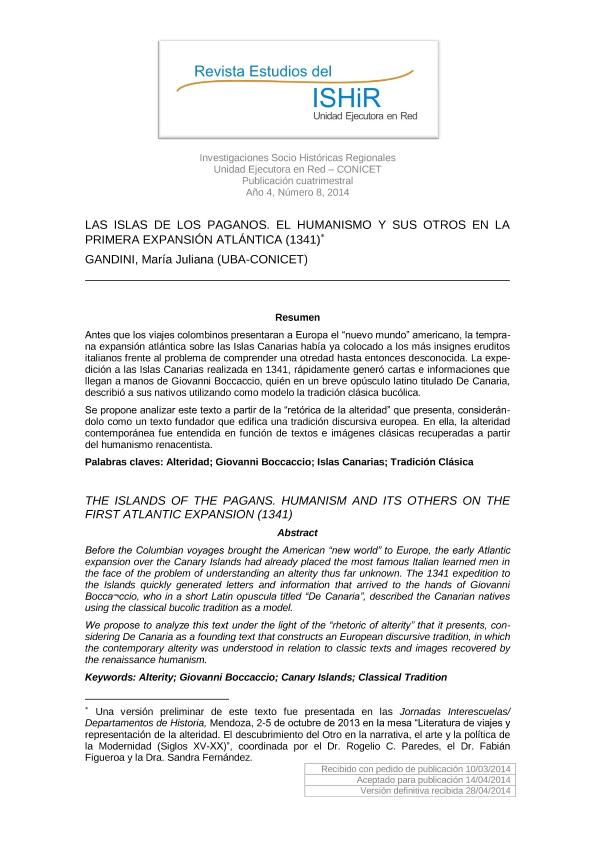Artículo
Antes que los viajes colombinos presentaran a Europa el “nuevo mundo” americano, la temprana expansión atlántica sobre las Islas Canarias había ya colocado a los más insignes eruditos italianos frente al problema de comprender una otredad hasta entonces desconocida. La expedición a las Islas Canarias realizada en 1341, rápidamente generó cartas e informaciones que llegan a manos de Giovanni Boccaccio, quién en un breve opúsculo latino titulado De Canaria, describió a sus nativos utilizando como modelo la tradición clásica bucólica. Se propone analizar este texto a partir de la “retórica de la alteridad” que presenta, considerándolo como un texto fundador que edifica una tradición discursiva europea. En ella, la alteridad contemporánea fue entendida en función de textos e imágenes clásicas recuperadas a partir del humanismo renacentista. Before the Columbian voyages brought the American “new world” to Europe, the early Atlantic expansion over the Canary Islands had already placed the most famous Italian learned men in the face of the problem of understanding an alterity thus far unknown. The 1341 expedition to the Islands quickly generated letters and information that arrived to the hands of Giovanni Bocca¬ccio, who in a short Latin opuscula titled “De Canaria”, described the Canarian natives using the classical bucolic tradition as a model. We propose to analyze this text under the light of the “rhetoric of alterity” that it presents, considering De Canaria as a founding text that constructs an European discursive tradition, in which the contemporary alterity was understood in relation to classic texts and images recovered by the renaissance humanism.
Las islas de los paganos: El humanismo y sus otros en la primera expansión atlántica (1341)
Título:
The islands of the pagans: Humanism and its others on the first atlantic expansion (1341)
Fecha de publicación:
05/2014
Editorial:
Investigaciones Socio-Históricas Regionales
Revista:
Estudios del ISHiR
ISSN:
2250-4397
Idioma:
Español
Tipo de recurso:
Artículo publicado
Clasificación temática:
Resumen
Palabras clave:
ALTERIDAD
,
BOCCACCIO, GIOVANNI
,
ISLAS CANARIAS
,
TRADICIÓN CLÁSICA
Archivos asociados
Licencia
Identificadores
Colecciones
Articulos(SEDE CENTRAL)
Articulos de SEDE CENTRAL
Articulos de SEDE CENTRAL
Citación
Gandini, María Juliana; Las islas de los paganos: El humanismo y sus otros en la primera expansión atlántica (1341); Investigaciones Socio-Históricas Regionales; Estudios del ISHiR; 4; 8; 5-2014; 21-36
Compartir




